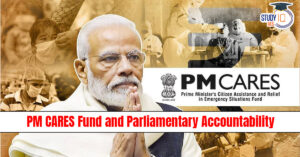Table of Contents
As India stands at the crossroads of automation, inequality, and economic uncertainty, the idea of a Universal Basic Income (UBI) — once seen as utopian — is now emerging as a realistic policy solution.
The call to “redraw the welfare architecture and place a UBI at its centre” reflects the need for a rights-based, inclusive social protection model that matches the complexities of the 21st century.
A UBI proposes a fixed, unconditional cash transfer to all citizens, regardless of income or employment status, ensuring a basic level of economic security for everyone.
What is Universal Basic Income (UBI)?
A Universal Basic Income is a guaranteed minimum income paid regularly to every citizen without any conditions.
It differs from traditional welfare schemes by being:
-
Universal: Covers everyone, not just the poor.
-
Unconditional: No eligibility or work requirements.
-
Periodic: Transferred at regular intervals (monthly/quarterly).
-
Individual-based: Paid directly to individuals, not households.
In simple terms, it’s a safety net for all citizens, ensuring that no one falls below a minimum standard of living.
Why UBI is Needed in India
1. Rising Economic Inequality
India’s inequality has reached historic highs:
-
According to the World Inequality Database (2023):
-
Top 1% own 40% of national wealth.
-
Top 10% control 77% of all assets.
-
-
The Gini Index for wealth inequality stands at 75, one of the highest globally.
Meanwhile, the bottom 50% of the population holds only a fraction of total wealth.
Despite 8.4% GDP growth in 2023–24, prosperity has not trickled down to all — exposing the limitations of GDP-based growth models.
2. Jobless Growth and Automation
Technological disruption and AI are redefining work:
-
A McKinsey Global Institute report warns that up to 800 million jobs could be lost to automation worldwide by 2030.
-
India’s semi-skilled and informal workforce is most at risk.
A UBI can act as a financial cushion, supporting workers during transitions and preventing mass unemployment from turning into social unrest.
3. Fragmented Welfare System
India currently runs hundreds of welfare schemes, from food subsidies to pension plans.
These programs suffer from:
-
Leakages and duplication,
-
Exclusion errors, and
-
Administrative inefficiency.
A UBI, by contrast, uses India’s growing digital infrastructure (Aadhaar + DBT + Jan Dhan) to deliver direct, corruption-free cash transfers to all.
4. Moral and Philosophical Case
At its core, a UBI redefines the citizen-state relationship.
It restores dignity and autonomy, treating every citizen not as a welfare recipient but as a rights-bearing individual.
“Universality, not means-testing, is the welfare architecture fit for a 21st-century democracy.”
How a Universal Basic Income Would Work
| Step | Mechanism | Outcome |
|---|---|---|
| 1️⃣ | Direct cash transfers via DBT to Jan Dhan accounts | Transparent, fast delivery |
| 2️⃣ | Periodic payment to all citizens (e.g., ₹1,000–₹1,500 per month) | Income stability |
| 3️⃣ | Funding through subsidy rationalisation, progressive taxes, and carbon taxes | Fiscal sustainability |
| 4️⃣ | Gradual rollout starting with vulnerable groups | Controlled implementation |
The focus is not on replacing every welfare scheme immediately but building UBI as the foundation of a modern, universal social safety net.
Benefits of UBI
1. Reduces Poverty and Inequality
A guaranteed income ensures a minimum living standard, reducing poverty without bureaucratic filters.
Pilot projects in Madhya Pradesh (2011–13), led by SEWA, showed:
-
Higher nutrition levels
-
Increased school attendance
-
Better asset creation
-
Greater participation by women in household decisions
2. Stimulates Local Economies
Money in citizens’ hands boosts consumer demand, especially in rural areas.
When households spend locally, it revives micro-businesses and strengthens the real economy.
3. Empowers Women and Caregivers
UBI recognises unpaid labour, particularly the invisible care work done by women.
It gives women financial independence and strengthens their voice in decision-making.
4. Simplifies Welfare Delivery
UBI reduces administrative costs by replacing overlapping schemes with one streamlined system.
It also removes the stigma of poverty-based benefits.
5. Stabilises the Economy During Shocks
During pandemics, automation waves, or climate crises, a UBI acts as a permanent shock absorber — ensuring liquidity, stability, and resilience for households.
Challenges and Criticisms
| Concern | Explanation | Possible Solution |
|---|---|---|
| Fiscal feasibility | ₹7,620/year per person (~5% of GDP) may strain the budget. | Start small, phase rollout, rationalise subsidies. |
| Inflation risk | More cash may raise prices. | Control supply, manage inflation through production & fiscal discipline. |
| Universal coverage | Benefits go to rich and poor alike. | Begin with vulnerable groups, expand later. |
| Digital divide | Rural, tribal populations may face access issues. | Strengthen financial inclusion, digital literacy. |
Way Forward: A Phased Approach
-
Pilot Phase:
Begin with targeted groups — women, elderly, persons with disabilities, and low-income workers. -
Evaluation Phase:
Assess impact on poverty reduction, inflation, and labour participation. -
Expansion Phase:
Gradually scale to a near-universal model, replacing inefficient subsidies. -
Integration:
Complement UBI with existing welfare programs like PDS and MGNREGA until stability is achieved.
Global Experiences with UBI
| Country | Key Outcome |
|---|---|
| Finland (2017–18) | Improved mental health and life satisfaction |
| Kenya | Better food security, school attendance |
| Iran | Reduced poverty without lowering work participation |
| Madhya Pradesh, India | Increased productivity, savings, and women’s empowerment |
Conclusion
Universal Basic Income represents more than just an economic reform — it’s a social transformation.
It promises to restore dignity, reduce inequality, and build resilience in a future defined by automation and insecurity.
As Saptagiri Sankar Ulaka argues,
“The question is no longer ‘Can we afford UBI?’ but ‘Can we afford the cost of mass insecurity?’”
UBI could become the cornerstone of India’s next welfare revolution, ensuring that growth is not just measured by GDP, but felt in every household.


 PM CARES Fund and Parliamentary Accounta...
PM CARES Fund and Parliamentary Accounta...
 Confidence Motion Against Om Birla: Cons...
Confidence Motion Against Om Birla: Cons...
 International Day of Women and Girls in ...
International Day of Women and Girls in ...

























